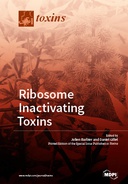Explore

Ribosome Inactivating Toxins
0 Ungluers have
Faved this Work
Login to Fave
Ribosome inactivating proteins (RIPs) form a vast family of hundreds of toxins from plants, fungi, algae and bacteria. RIP activities have also been detected in animal tissues. They target a single adenine of a ribosomal RNA, thereby blocking protein synthesis and leading intoxicated cells to apoptosis. The role of plant RIPs may be related to plant defense against predators and viruses, plant senescence or bacterial pathogenesis. Most RIPs are no threat to human or animal health. However, several bacterial RIPs are major virulence factors involved in severe epidemic diseases such as dysentery or the hemolytic uremic syndrome that may occur in patients suffering from Shiga toxin-producing entero-hemorrhagic Escherichia coli infection. Several plant RIPs such as ricin toxin, abrin or sarcin have been, or may be involved in accidental or criminal poisonings, political intimidation or bio-suicides. Health crisis, biosafety and biosecurity issues became a major concern and many efforts are made to develop treatments. Finally, RIPs can be engineered into immunotoxins to destroy cancer cells or cells chronically infected by viruses.This book presents the most recent data on all aspects of RIPs including function, diversity and evolution, mechanism, pathophysiology, medical countermeasures and engineering into anticancer drugs.
This book is included in DOAB.
Why read this book? Have your say.
You must be logged in to comment.
Rights Information
Are you the author or publisher of this work? If so, you can claim it as yours by registering as an Unglue.it rights holder.Downloads
This work has been downloaded 196 times via unglue.it ebook links.
- 186 - pdf (CC BY-NC-ND) at Unglue.it.
Keywords
- medicine
- Ribosome inactivating protein
- ricin
- Shiga toxin
- toxin
Links
DOI: 10.3390/books978-3-03897-249-5Editions


